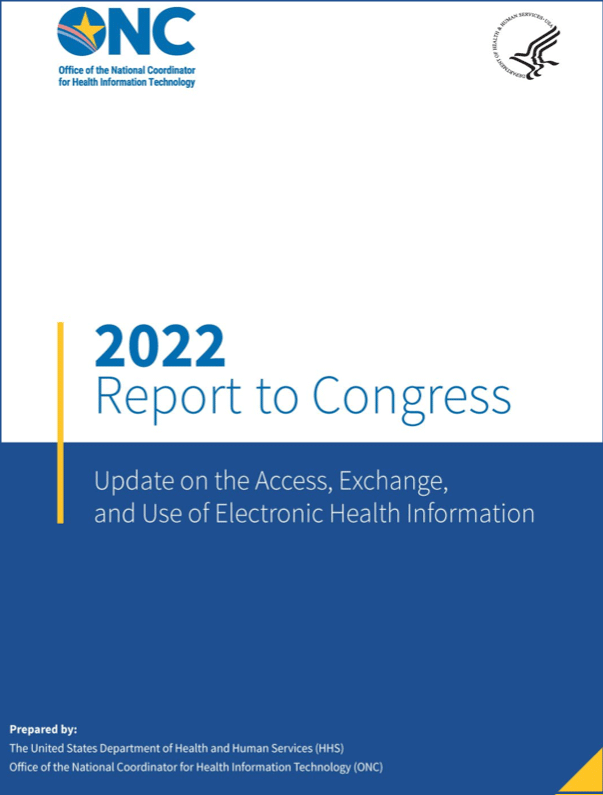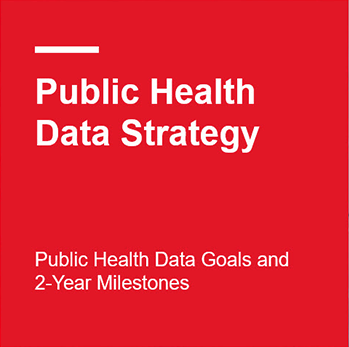 With respect to public health data systems, the report focuses on the advances made during the pandemic with particular mention given to electronic case reporting (eCR) and immunization information systems (IIS), as well as a shout-out to CDC’s Data Modernization Initiative (DMI). Barriers to improved information interoperability include the need for modern, interoperable public health data systems (p. 19) through more pervasive use of standard application programming interfaces (APIs), TEFCA when it comes, and more bi-directional exchange of information as is already accomplished, for instance, by IIS. Much of the focus of the report (as it should be) is on exchange of information to support clinical care across the care continuum, including the features necessary in certified electronic health records (EHRs) to promote exchange and inhibit information blocking. Standards, including FHIR and USCDI, play a prominent role in the report. Public health plays a prominent role in these two activities, including active participation in HL7’s Helios project
With respect to public health data systems, the report focuses on the advances made during the pandemic with particular mention given to electronic case reporting (eCR) and immunization information systems (IIS), as well as a shout-out to CDC’s Data Modernization Initiative (DMI). Barriers to improved information interoperability include the need for modern, interoperable public health data systems (p. 19) through more pervasive use of standard application programming interfaces (APIs), TEFCA when it comes, and more bi-directional exchange of information as is already accomplished, for instance, by IIS. Much of the focus of the report (as it should be) is on exchange of information to support clinical care across the care continuum, including the features necessary in certified electronic health records (EHRs) to promote exchange and inhibit information blocking. Standards, including FHIR and USCDI, play a prominent role in the report. Public health plays a prominent role in these two activities, including active participation in HL7’s Helios project
The report contains a nice section summarizing various strategies for modernizing public health data systems (pp. 38-42). The recommendations are focused on the usual things that ONC has been working on over the past several years: support for health equity, TEFCA, USCDI, information blocking, standards adoption and standard APIs, and, last but not least, modernizing public health data systems.
 Next, the Centers for Disease Control and Prevention (CDC) released this month its Public Health Data Strategy: Public Health Data Goals and 2-Year Milestones (see short version as well). According to the executive summary, the strategy “…outlines the data, technology, policy, and administrative actions essential to exchange critical core data efficiently and securely across healthcare and public health,” and is “…designed to describe a path to address gaps in public health data, helping the nation become response-ready, promote health equity, and improve health outcomes for all.” The near-term priorities are meant to be enabled and supported by the Data Modernization Strategy (DMI) to reduce the time it takes to share data and identify new public health threats more quickly.
Next, the Centers for Disease Control and Prevention (CDC) released this month its Public Health Data Strategy: Public Health Data Goals and 2-Year Milestones (see short version as well). According to the executive summary, the strategy “…outlines the data, technology, policy, and administrative actions essential to exchange critical core data efficiently and securely across healthcare and public health,” and is “…designed to describe a path to address gaps in public health data, helping the nation become response-ready, promote health equity, and improve health outcomes for all.” The near-term priorities are meant to be enabled and supported by the Data Modernization Strategy (DMI) to reduce the time it takes to share data and identify new public health threats more quickly.
The strategy goes on to identify key partners in the public health ecosystem, and a core set of public health data. Four short-term goals are identified for the next two years with specific milestones:
- Strengthen the core of public health data
- Accelerate access to analytic and automated solutions to support public health investigations and advance health equity
- Visualize and share insights to inform public health action
- Advance more open and interoperable public health data
HLN is extensively involved in activities that support these CDC goals and milestones. Our work developing and supporting the Reportable Conditions Knowledge Management System (RCKMS), a key component of the national eCR initiative, is ongoing, including support for public health agencies who author rules for this decision support system. Our work on the Immunization Gateway (IZG) Project includes participation on the core team that is enabling interoperability between IIS and with clinical systems in large Federal agencies like VHA and DOD; we also are involved in implementing this connectivity within the IIS we directly support in NYC and RI. And our ongoing DMI work with the CDC Foundation and the Public Health Informatics Institute (PHII) directly support activities in this plan.
This post was published in the HLN Blog. It is reprinted by Open Health News with permission. The original post can be found here.
